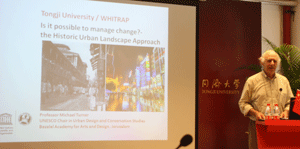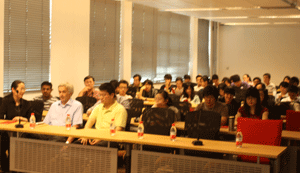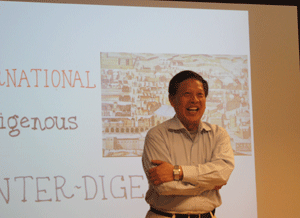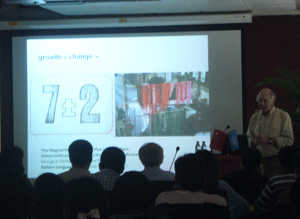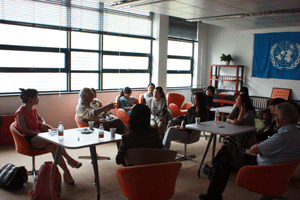| Prof. Michael Turner Introduce Conservation of HUL in Tongji |
| PublishDate:2011-05-30 Hits:4195 |
On 7th May 2011, Prof. Michael Turner, the UNESCO Chair in Urban Design and Conservation Studies from the Bezalel Academy of Arts and Design in Jerusalem, delivered a lecture entitled “Is it possible to manage change? The Historic Urban Landscape Approach”. Prof. Turner shared new thoughts and approaches in the field of cultural heritage conservation. Prof. WU Jiang, ZHOU Jian, HAN Feng and LU Yongyi attended the lecture. Serving on many international professional-academic bodies, he has chaired the Israel World Heritage Committee for the past decade and an initiator of a National Archive for Art, Architecture and Design linked to the UNESCO Memory of the World. He has long been involved in cultural research and education of architecture and urbanism, and has actively participated in academic seminars and workshops around the world. In the four decades since 1970, he has played an important role in the conserving of the urban historic cultural heritage in Jerusalem. In a relaxing atmosphere Prof. Turner started his lecture with the concept of “change”. He explained the word through a series of applications that called for in-depth discussion on issues such as population explosion, industrial revolution and the evolution of urban landscapes. He also resorted to theories and terms of other disciplines to analyze the concept including the analogy of transplants, the “7±2” theory, metamorphosis and the lifecycles of complex objects. He pointed out that rapid urbanization has imposed threats to the environment and that the development of heritage sites with the transplanting of modern buildings into the historic areas has led to changes in the landscape. To confront the problem, we must first define the heritage values. Prof. Turner said that a value of heritage, as its cultural identity, is endowed by people from different groups. Throughout the lecture, Prof. Turner gave emphasis on the necessity to respect the subjective values, or in other words, to respect the diversity of culture and acknowledge the legitimacy of all cultures. He followed up by focusing on the meanings of integrity to include 'all elements necessary to express the values and to ensure the complete representation of the features that convey the property’s significance'. He also listed new approaches to analyze heritage values, conservation strategies and tools and introduced the approach of Historic Urban Landscapes (HUL) within the framework of the new proposed international recommendation. He ended his lecture by pointing out that urban conservation is both international and indigenous coining the term 'interdigenous'. The lecture was compact and lively and in summing up Prof. Turner said that the methodologies of urban planning and conservation are not only targeted to historic cities but applicable also to emerging cities. After the lecture, Prof. Turner exchanged views with faculty and students present at the meeting, and shared his opinions on some difficult questions brought up by the students, as the conflicts between heritage conservation and living standards of the local community and leadership policy versus conservation implementation. The students were greatly inspired by the remarks drawn from his rich experiences. |
- News | WHITRAP Shanghai and CNR-ISPC bilateral meeting
- News | WHITRAP meets Cité de l’Architecture et du Patrimoine
- WHITRAP Hosting "Workshop on Preliminary Assessment for National Focal Points of the Asia Region" in Chengdu
- WHITRAP Shanghai meets UNESCO
- INTERNATIONAL CONFERENCE PRELIMINARY ANNOUNCEMENT & CALL FOR PAPERS
- Observation of the 46th Session of the World Heritage Committee
Copyright © 2009-2012 World Heritage Institute of Training and Research-Asia and Pacific (shanghai)


